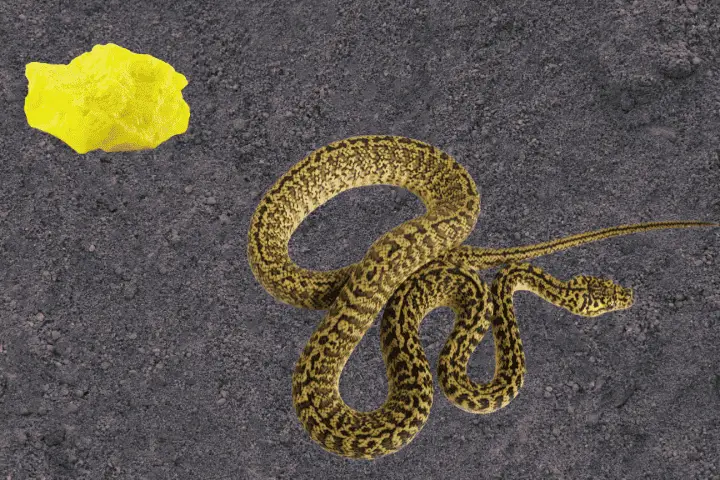Does Sulfur Keep Snakes Away
Snakes are feared by many, and repelling them is a priority. One theory claims sulfur is the answer.
Does it really work? Let’s find out.
It is said that snakes hate the smell of sulfur. Many swear by it as a repellent, leading to products containing it.
But there is no scientific proof of this.
Snakes rely on their sense of smell. Smells may disrupt their perception and stop them entering certain areas.
Sulfur’s strong odor is thought to be one such smell. Yet, there is no proof.
Different species have different behavior patterns. This is based on factors like habitat, food, temperature, and territory.
So, sulfur may work for some snakes, but not universally.
What is sulfur?
Sulfur, an element with atomic number 16, is a yellow solid known for its strong smell. It’s found in volcanoes and used in industrial processes – from fertilizers to rubber.
Some believe sulfur repels snakes. Rumor has it they don’t like the smell. But, science isn’t sure.
Snakes rely more on heat and vibration than smell. Plus, different snakes may respond differently.
There’s an anecdote of a homeowner desperate to get rid of snakes in their garden. So, they sprinkled sulfur powder around.
To their surprise, snake sightings went down. But, it’s hard to know if this was because of the sulfur or something else.
Do snakes dislike sulfur? Possibly, if it smells worse than they do.
Do snakes dislike sulfur?
Snakes and sulfur have a complex connection. It’s generally assumed snakes don’t like sulfur, but it’s not that simple. Here are 5 points to ponder:
- Snakes rely heavily on their sense of smell. Sulfur has a strong odor and can be too much for them, making them stay away from places with high sulfur levels.
- Different snake species react differently to sulfur. For instance, some rattlesnakes avoid areas with sulfur, while others don’t seem to mind.
- Scientists still debate if sulfur is an effective snake repellent. Some say yes, but there is not enough evidence to back up these claims.
- Relying solely on sulfur might not work in all cases. Snakes can adapt and get used to the smell, or find another way around it.
- A combination of methods is best for keeping snakes away. This includes sealing entry points, removing hiding spots, and keeping the environment neat.
Plus, there’s an interesting story about this. Someone sprinkled powdered sulfur around their property to keep snakes away.
At first, it worked. But after a few weeks, the snakes returned, unaffected by sulfur. This shows why it’s important to use multiple snake control methods and tailor them to your specific situation.
So, when it comes to snakes and sulfur, it’s complicated. Some may be deterred, while others aren’t.
To get the best results, use a variety of strategies and adjust them to your needs.
How to use sulfur to repel snakes
- Gather sulfur from stores or garden centers. It comes in powdered or pellet form.
- Identify areas snakes are seen, like gardens, yards, and outdoor structures.
- Sprinkle sulfur around the perimeter of these locations. This creates a barrier to stop snakes from entering.
- Sulfur has a distinct smell which can be unpleasant. This fades over time and is not harmful.
- In one rural community, there was a lot of venomous snakes. Residents used sulfur and noticed a decrease in sightings and incidents. This success spread, and many adopted the method.
- Sulfur is an accessible and easy-to-implement solution for those wanting protection from snakes. Just remember it won’t do much for your love life.
Precautions and limitations
Sulfur may be able to keep away snakes, but there are certain things to consider. Here are a few tips:
- How long it lasts: Regular reapplication is needed for optimal results as effectiveness can decrease over time.
- Environment: Weather such as rain or high humidity may reduce sulfur’s impact.
- Places to apply: Focus on spots where snakes often appear, like entry points or nesting sites.
- Safety: Follow safety guidelines when using sulfur, such as wearing protective gear and avoiding contact with eyes and skin.
Also, sulfur may not be effective against all types of snakes. Some may not be affected at all. So, consult with experts for tailored advice for your situation.
Be certain to take proper precautions to protect your home and family.
Be aware of the limitations of using sulfur and check out other preventive measures.
Conclusion
Research and evidence shows us that sulfur has no real effect on repelling snakes. Though some people claim success, science disagrees.
Snakes use their sense of smell and taste to explore.
It is thought that sulfur’s strong smell might stop them from entering certain areas. Yet, there is not much scientific evidence for this.
Experts tested various repellents to check their snake-repelling power. Things like cinnamon and clove oil did well, but sulfur did not.
The effectiveness of any snake repellent changes with things such as the species, environment, and snake behavior.
Some snakes may be more sensitive to certain smells than others.

